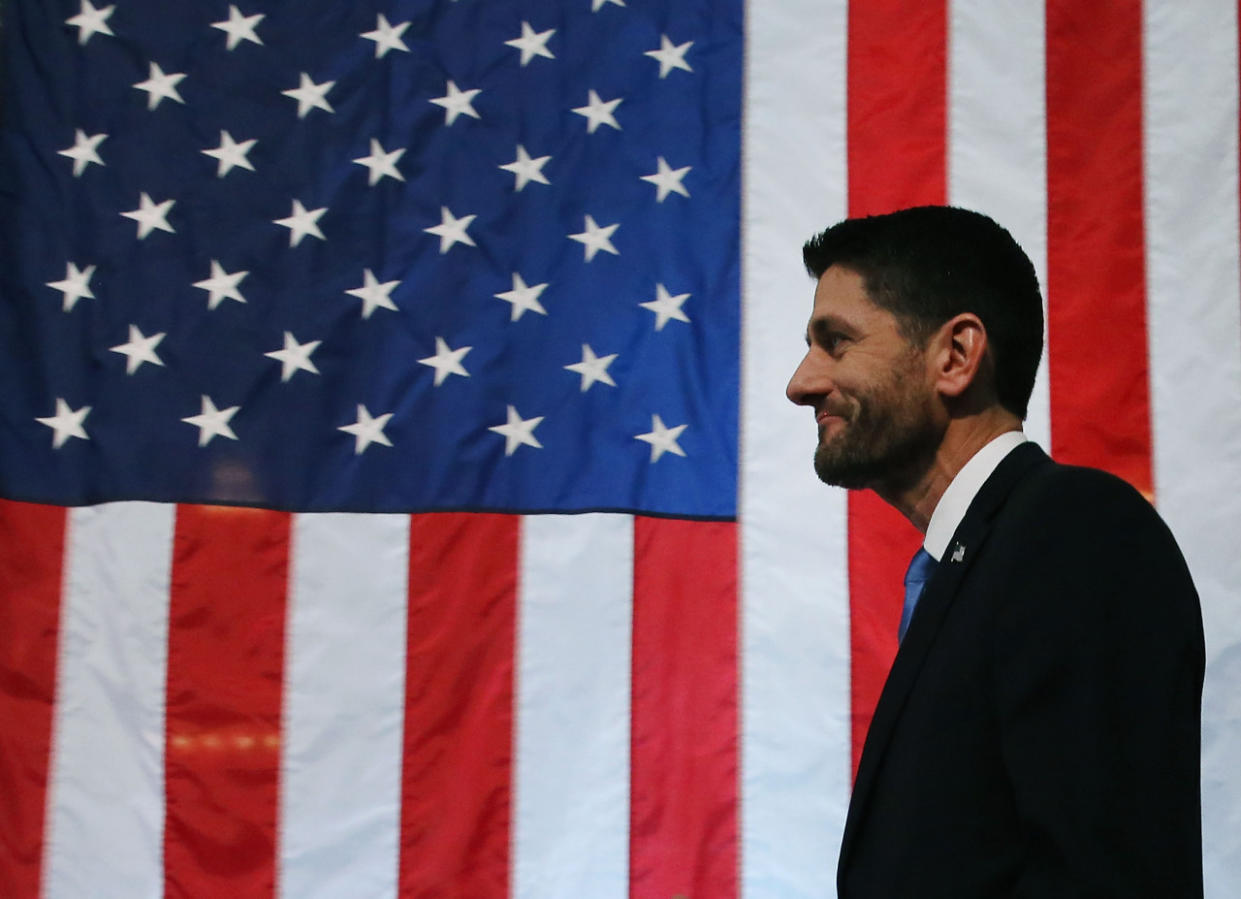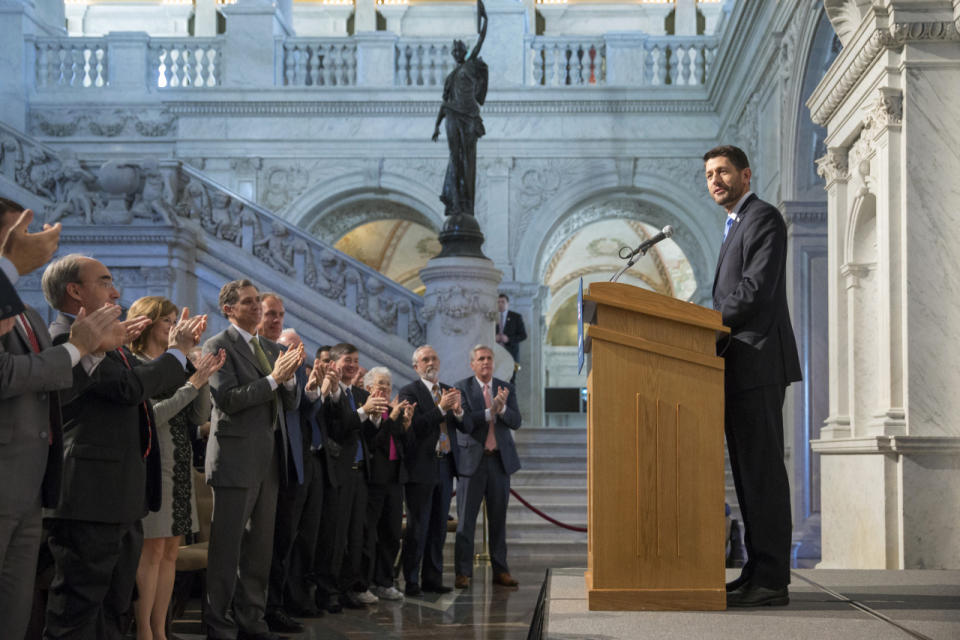Paul Ryan sets 2016 House agenda as if he’s campaigning for president

Speaker Paul Ryan prepares to give a speech on his vision for the Republican Party at the Library of Congress. (Photo: Mark Wilson/Getty Images)
Speaker Paul Ryan, R-Wisc., began planning the speech he delivered Thursday, about the future of the Republican Party, back in August. That was before then-Speaker John Boehner, R-Ohio, announced his resignation, before the chaos that ensued as the party sought to replace him and before Ryan himself was persuaded to save his party by taking a job he had never sought.
In August, Ryan was “just” the chairman of the Ways and Means Committee, a former Republican vice presidential nominee, one of the leading conservative policy thinkers in Washington and a 45-year-old politician who had a not-so-secret ambition to run for president himself one day.
So perhaps the fact that the speech was planned before his speakership constitutes the most useful lens through which to consider Ryan’s address in the stately Great Hall of the Library of Congress — a speech conceived by an ambitious but still on-the-rise Ryan and delivered by the now-speaker of the House, calling on the Republican Party to reinvent itself as a party of forward-looking ideas, while also disparaging President Barack Obama. But Ryan’s remarks, instead of rallying voters or prompting the party at large to rethink itself generally, seemed specifically aimed at getting the conservative members of the House Republican caucus — dozens of whom were in attendance — to join the challenging campaign Ryan now faces: finding legislative purpose and party cohesion in the House.
“We have controlled Congress, but not the presidency. And we need to. This country has big problems. But if we do not have a president who will work with us, we will not solve those problems — that is, while they are still solvable,” Ryan said. “I don’t think all that many people are walking away from this presidency thinking, ‘That went well.’ We still have enormous problems. But now the country is divided. And the federal government has grown arrogant, condescending and outright paternalistic. So I’d say what we’ve seen these past seven years is the illusion of success. The left may be good at tactics. But tactics are not solutions. They can win an election. But they can’t win a mandate.”
Ryan called for big ideas — a word he mentioned 13 times in various iterations — yet was light on details of the specific proposals he outlined. He said that Republicans should stop wishing that they could “time-travel” back to 2009 and undo what Obama and Congressional Democrats had done, an allusion to the two sweeping legislative initiatives of that era, health care and Wall Street reform (though he never mentioned the latter specifically). And he warned Democrats that in 2016, he would push legislation through the House, even over the threat of a presidential veto.
The guiding principle of the speech, as outlined by the speaker and his aides before he delivered it, was “American confidence,” a perhaps more concise version of the “Make America Great Again” tagline that has galvanized the right.
“Only government that sends power back to the people can make America confident again. And we House Republicans will do all we can to give us that government — even if the president disagrees. Even if he won’t sign them into law, we will put out specific proposals and give the people a real choice,” Ryan said. “And I don’t mean just undo what the president has done — as if we could time-travel back to 2009. I mean show what we would do, what our ideal policy would be — looking forward to 2017 and beyond. We owe it to the country to offer a bold, pro-growth agenda. And that is what we are going to do.”

Republican members of the House applaud Ryan’s address on how Republicans should approach Congress and governing in 2016. (AP Photo/J. Scott Applewhite)
Ironically, about an hour after Ryan renounced the idea of “time travel” to reject Democratic legislation that has now become law, the Senate began voting to pass an already House-approved bill to repeal Obamacare. Later in his speech Ryan described repealing and replacing the health care law as the most “urgent” action facing Congress.
“When people ask me what’s wrong with the law, I usually say to them, how much time do you have? But if I had to point out one thing, it would be the mandates, the restrictions, all the red tape,” Ryan said. “How do I know they have failed? You notice we don’t talk about lowering premiums anymore. We’re supposed to be happy if they don’t go up by double digits.”
Ryan vowed that in 2016, House Republicans would unveil a plan to replace Obamacare, though multiple GOP leaders have made that same promise and failed to deliver, settling for holding more than 50 votes just to repeal the law.
Ryan also called for an overhaul of the complicated and decades-old tax code, which long has been a personal priority of his. Many Republican sources at the time believed that Boehner did not push a tax code rewrite authored by Ryan’s predecessor at Ways and Means, Rep. Dave Camp (R-Mich.), because Ryan wanted the job (and credit) for himself and Boehner trusted him, and thought he might have the credibility among conservatives to get it passed.
The other main policy focus of what came off as a State of the GOP address was on creating a “21st-century military,” but here, too, Ryan talked more in platitudes than in details, save mentioning “advanced missile defense or directed energy weapons.”
But make no mistake: Ryan’s speech was important. Because as Republicans scramble at the presidential level to wrestle control of their primary process away from political outsiders like Donald Trump or Ben Carson, Ryan is a significant figure. Not only is he now Washington’s most important Republican, but for years, he’s been a politician simultaneously favored by the establishment and admired, or at least trusted, by the conservative far right. In this regard, he is a bit of a political unicorn. He still is, but now he has a megaphone for his ideas.
“What it all comes down to is whether we conservatives have confidence in ourselves. Do we really believe our philosophy is true? Do we have the best ideas? If so, then I don’t see any reason why we should hold back,” Ryan said. “The truth is, the left wants to make the debate about personalities. They want to paint us as irresponsible. That’s because we all know what the left stands for. We all know what another progressive presidency would mean: just more of the same.”
Ryan also can imagine what a conservative presidency would mean, and probably what a conservative president would look like: a lot like Paul Ryan, maybe, four or eight years older. Meanwhile, he controls the House of Representatives, and the rest of the country can see for itself how he might govern.

